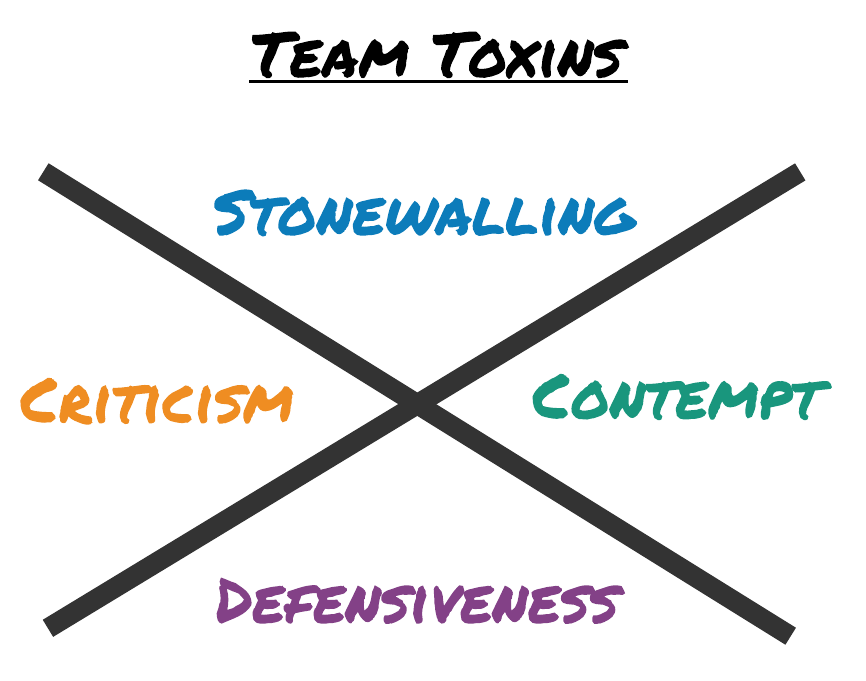Team toxins have the ability to wreak havoc on our teams and organizations if left unchecked.

Team toxins can lead to team conflict if people are not aware of and able to deal with toxins. Understanding team toxins is one preemptive way to deal with team conflict.
The four team toxins are:
- Criticism (or Blaming)
- Defensiveness
- Stonewalling
- Contempt
Working with people, teams, and leaders within organizations, there are many times where I see team toxins. Often they are just in passing and have not reached a fully “toxic” level. In some cases however, they are blocking (or on the way to blocking) the teams or organizations ability to be successful — team conflict is brewing. The challenge in trying to label a situation as “good” or “bad” is that every situation is unique. It may be similar to another situation, but there are always differences. Working with people, teams, groups, and organizations to understand team toxins is a valuable way to deal with Team develops better ways to work together, collaborate, and succeed.
Teams who are able to work with Toxins, have the ability to create the foundation of antifragile relationships — meaning they actually improve with change and challenges.
Toxins are Normal
Team toxins, based on work by Dr. John Gottman are normal.
While the four toxins don’t sound like things anyone would want to experience or use, we all do. They are a normal part of being human, so unless you are an alien and arrived on a spaceship, you will experience them. This is not to say you should set up camp in any one of them and “live there!” Anyone in a team, organization, or any relationship system has also experienced toxins from others in the system with them. All normal.
We might see a team that someone labels as “defensive”, but if we are curious, we should be able to work to understand what is really happening with the team and the people on the team. Labels can often just me another toxin (criticism) and simply using criticism denies us the opportunity to learn and actually be open to understanding.
Remembering that we are all human and toxins are normal is step one.
Toxins Are Valuable

Despite how we often portray people who are doing something we do not agree with as “doing something dumb”, people are rarely acting in a certain way just to annoy you! If we start with ourselves, we have to ask why we choose to use certain toxins. Consider which of the four you prefer. You have to pick one as your preference – we all have one. Maybe you have one for certain situations.
When someone exhibits a toxin, it is not because they are bad or evil, it is because the toxin is valuable to them.
Let’s consider stonewalling. Stonewalling may look like any of these — withdrawal, avoidance, side stepping organizational structure, not open to influence, passivity, or disengagement.
You may find it strange at first to consider that there is value in any of these, but think about a time in your life when YOU have done one of these things. Think of a time when you were disengaged or withdrawn. What about at time you avoided a situation that you should have engaged in? We have all done this. I certainly have. Thinking about that same situation (it helps to actually think of one!) — what was valuable to you about your toxin you adopted? Perhaps you were protecting yourself or staying safe? Perhaps avoiding the situation was what you needed in that moment.
Changing our perception on toxins to be curious about the value they are providing is a way to take charge and deal with them. If they are all hidden away and we can’t (don’t/won’t) talk about them, how can we ever hope to improve and collaborate at the levels we need to in order to do amazing things.
Toxins Lead to Toxins — and Conflict
Imagine you read the last section and thought, ‘I don’t want to do amazing things with these idiots I work with.’ That sounds a bit like contempt (appears as sarcasm, hostile humor, demeaning gossip, eye rolling, disrespect, or undermining).
Maybe there are “good” reasons why you have contempt for someone, perhaps they were checked-out and left you in a bad position at work. Maybe they never take responsibility for anything! Although now this starts to sound like criticism.
You can see the problem. We can quickly get into this criticism trying to figure where this toxic behavior started. Often this spirals into singling out 1 person or every a group of people who are “the cause.”
Looking at criticism (may sound like bullying, domination, personal attacks, harsh start-ups, overly driving, or aggressive attacks) or defensiveness (may look like refusal to take responsibility, it’s not my fault, I’m not supported, victimization, or being closed off to influence) you can see how these may add to the toxic situation if the team is not able to deal with them.
So a team that exhibits a lot of toxic behaviors without intervention, will lead to more toxins! They build on each other. More toxins tend to lead to more conflict
The Root Cause(s) of Toxins?
We can see fairly clearly that many toxins may come from issues like: frustration, actual or perceived lack of power, inability to affect change, and lack of safety. But, we have to be careful not to assume we know what the specific cause is. Avoid that situation where you are telling someone else why they should or should not feel a certain way. If you take nothing else from this article take this “you can’t tell another person how to feel!”
Beginning to understand some common reasons for toxins may help you step back into curiosity to really wonder what is happening. Each person has different perceptions, ideas, and backgrounds. How strong is your teams relationship? How able are you or others on the team able to actually speak out and be heard?
My experience, personally, and in coaching others, is that we are rarely equipped to deal with these ideas and concepts in course of the “normal” training and experience we have in our education system and the business world.
Big Challenges
Beyond the Team: You may work with the team (or perhaps you are on the team), and realize that there are aspects affecting team members that are coming from outside the team. There may be issues that people are facing from their personal life or from other areas of the organization.
For example, in a team I was once on, a number of us were defensive and criticism. Getting to the root of it, revealed that we were not feeling safe in the organization. We had all been giving different information and often that put us in direct conflict with each other. Situations like this are challenging (understatement alert), but the first step for us, was to at least talk about what was happening and to, within the team, be able to start to present a more unified team front. This also means we had to begin to talk to the people who were giving us different information to start to understand why that was happening.
This is a large topic unto itself, but I wanted to at least touch on it, since this can be quite common.
Ask for Help: These ideas are not trivial. These can be very scary ideas and concepts. For anyone in a really toxic situation, ask for help! Using these ideas can be very effective, however if things are already quite bad, this is not the place to start. You may need to start with mediation, coaching, personal development, engagement from managers, etc.
Consider Yourself

It is far too easy to simply say “I would not have been defensive if only… .” As you probably just realized, going to criticism does not solve the problem. We all need to start with ourselves and work on personal mastery. Personal mastery is a journey –you certainly never arrive. I can tell you I have had many ups and downs (much learning!!) on my personal journey.
We each need to look inward to ourselves first and ask “What can I do?” I don’t believe it is easy to do — but we must start with ourselves first. How are we reacting? How are we answering? Are we truly curious? Are we respectful? Are we honoring everyone in the team or the group.Take a look at Resolving Conflict by Working with Team Toxins for more ideas consider.
I wish I could always say I have or I will deal with my toxins “perfectly” — but I know, as a human, that is an impossible goal. Realizing you exhibit some toxins can be scary to admit. Learning better ways to deal with them however is a key to strong relationships and teams. The day I say “I never exhibit any toxins!” is the day I’ll be truly be scared.








